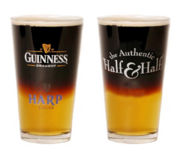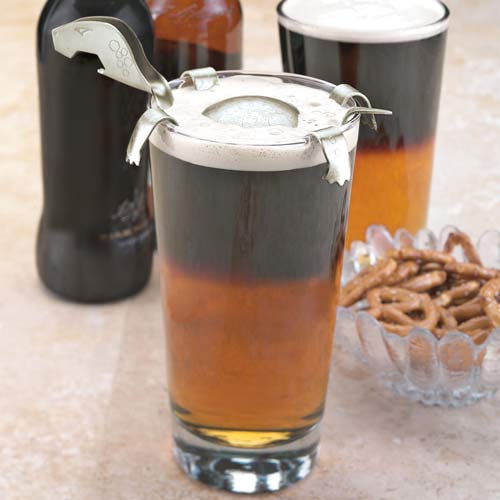After receiving two very insightful comments on my blog entitled, “Dissecting Guiness,” I thought it appropriate to do some research into the illusive “Black & Tan” — as well as the “Half & Half”.
What is a “Black and Tan”? What is a “Half & Half”? Well, the answer is in the eye of the beholder. The B&T tradition varies from person to person, depending on experience, culture, or preference. Wikipedia defines a Black and Tan as a drink made from a blend of pale ale and a dark beer such as a stout or porter. Historically, the most common “Black” part of this drink has been Guinness. The “Tan” part is usually the greatest source of debate.
“Black and Tan” was first used in reference to a breed of beagles (black and tan coon-hounds) used as hunting dogs in Ireland . The term was also used to refer to a regiment of British soldiers recruited to serve in Ireland after the First World War. They had a reputation for being quite brutal and have been accused of many atrocities against the Irish between the years of 1919 and 1921.
Contrary to popular belief — Black and Tan is not a drink commonly consumed in Ireland. (There is some hesitation to whether or not it is appropriate to order a Black and Tan in Dublin). The style is believed to have actually originated in British pubs. This is why many consider the classic Black & Tan combination to be Bass Pale Ale and Guinness.
The two most common types of Black and Tan in the United States use Guinness Draught and either Bass or Harp Lager. The Guinness is “layered” on top of the ale, taking advantage of the fact that Guinness is “carbonated” with both nitrogen and carbon dioxide, making it less dense than pure carbon dioxide.
In Ireland and England, the lower-cased term “half and half” refers to a combination of Guinness stout and Harp Lager (a subsidiary of Guinness), while the United States and Canada use the capitalized version “Half and Half” to describe the exact same beverage.
Typically, both “Black and Tan” and “Half and Half” drinkers prefer the beverage to be served layered.
How to pour a perfect Black and Tan:
- Hold the pint glass at an angle, and fill just over halfway with Bass Ale of Harps Lager — on tap.
- Slow the flow control on the Draught Guinness tap down to a trickle.
- Fill to the top, letting Draught Guinness hit the side of the glass.
or…
Pour Draught Guinness over an upside-down spoon to disperse the flow. (This method usually produces the best results.)
Other Guinness Variations:
Black and Blue
Guinness with Blue Moon Belgian White, Guinness and Pabst Blue Ribbon, or Guinness and Labatt Blue. Typically, this refers to any variation of stout coupled with blueberry-flavored ales or brands with the name “Blue” in them.
-
Black & SamGuinness stout and Samuel Adams Boston Lager
-
Black and Orange
-
Black Christmas (or Kwanzaa)Guinness draught over Christmas Ale.
-
Black & RedHalf Guinness and half Red Stripe.
-
Black CastleHalf Guinness and half Newcastle Brown Ale.
-
Black MagicHalf Guinness and Half Magic Hat #9.
-
Dead Black GuyHalf Guinness and Half Rogue’s Dead Guy Ale.
-




It’s certainly an attractive drink but I’d never order one of those myself. A waste of good Guinness, putting it in with an inferior beverage!
In Scotland a half and half is a shot of whiskey and a half pint of ale. That’s what we need here!
Here are a few other varieties:
– the Black Smith – Guinness over Smithwick’s. Many places also refer to this as a Black & Tan.
– the Black Cherry – Guinness over Sam Adam’s Cherry Wheat. The only thing with this is, good or bad, since you don’t really find Cherry Wheat on tap, you get two at one time.
After reading this article, I just feel that I need more info. Can you suggest some resources please?
Just yesterday I had a black and sam. I used The Cherry wheat, and poured Guiness on top. For the first time ever it came out perfect! and It was great!
Just fill the glass with any ale really just a little past half a glass, then pour guiness over a spoon into it.
Pingback: The Black and Tan « Lord of the Barflies